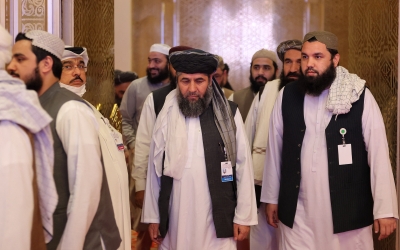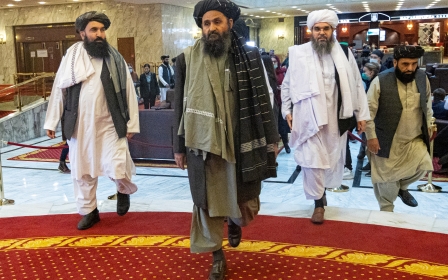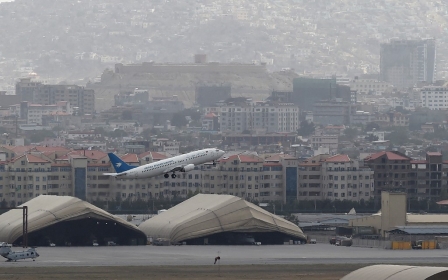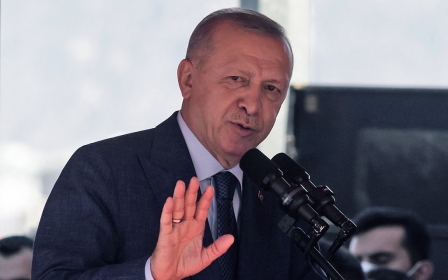Iran: President Raisi says US 'defeat' in Afghanistan a chance for lasting peace

Iran's President Ebrahim Raisi on Monday described the capture of Kabul in Afghanistan by the Taliban as a "defeat" for the United States and an opportunity for "lasting peace”.
The statement is the first public comment by the newly elected Raisi on the Taliban's seizure of power in Afghanistan on Sunday, after a 10-day offensive against the US-backed government of Ashraf Ghani.
'The military defeat and the US withdrawal from Afghanistan should offer an opportunity to restore life, security and lasting peace in that country'
- Iranian President Ebrahim Raisi
The ultraconservative president said the developments should pave the way for a durable peace in the neighbouring country.
"The military defeat and the US withdrawal from Afghanistan should offer an opportunity to restore life, security and lasting peace in that country," Raisi said, according to a statement published by the presidency on Monday.
The presidency statement came after the Taliban seized control of Kabul, but it did not mention the Taliban nor the fall of the Afghan capital.
New MEE newsletter: Jerusalem Dispatch
Sign up to get the latest insights and analysis on Israel-Palestine, alongside Turkey Unpacked and other MEE newsletters
Raisi, who made the remarks in a call with outgoing Iranian foreign minister, Mohammad Javad Zarif, said the Islamic Republic wanted good relations with Afghanistan.
Iran was "closely monitoring the evolution of events in Afghanistan" and wants good neighbourly ties with it, he said.
Raisi tasked Zarif and Iran's Supreme National Security Council to give him updated reports on the situation in Afghanistan, the statement added.
Zarif on Sunday said that "Iran stands ready to continue its peacemaking efforts" in Afghanistan.
"Violence and war - like occupation - never solve problems," he wrote on Twitter.
On Monday, Zarif held a meeting in Tehran with China's special envoy for Afghanistan, Yue Xiaoyong, the foreign ministry said, adding that the talks focused on the situation in Afghanistan.
His talks with the Chinese envoy come as a government spokeswoman in Beijing on Monday said China was ready to deepen "friendly and cooperative" ties with Afghanistan.
Iran’s ‘pragmatic stance’
Relations between the Islamic Republic of Iran and the Taliban in Afghanistan have never been easy.
In 1998, while ruling Iran's eastern neighbour, the organisation murdered nine diplomats and an Islamic Republic official News Agency (IRNA) journalist in the Iranian consulate in Mazar-i-Sharif in the north of Afghanistan.
In response, the Islamic Republic put its military on the offensive, building up forces on the border with an eye to a possible military operation against the Taliban.
Since that nadir in relations - eventually remedied in part by the US-led invasion a few years later - Iran and the Taliban have alternated between negotiation and animosity, with a range of different perspectives among Iranian officials as to how to deal with the group.
On 8-9 July this year, Tehran hosted a round of intra-Afghan talks with representatives of the Afghan government and the Taliban to discuss Afghanistan's future, following the pullout of US troops and the Taliban's capture of much of the country.
Analysts say Tehran is taking a pragmatic stance on the Taliban's resurgence in Afghanistan.
On Sunday the Iranian foreign ministry said it had reduced its diplomatic presence in Afghanistan.
That announcement came shortly after the Taliban reached the outskirts of the Aghan capital.
Foreign ministry spokesman Saeed Khatibzadeh said a skeleton staff remained at Iran's Kabul embassy and that employees had been also evacuated from three out of five diplomatic missions in other Afghan cities.
Iran shares a 900-kilometre border with Afghanistan, and hosts nearly 3.5 million Afghans, according to the UN refugee agency.
On Sunday Iran said it had prepared accommodation in three provinces to provide temporary refuge to Afghans fleeing their country.
But with its economy stifled by US sanctions, Iran has encouraged many of the more than two million undocumented and over 800,000 registered Afghan refugees in the Islamic Republic to return home.
Middle East Eye delivers independent and unrivalled coverage and analysis of the Middle East, North Africa and beyond. To learn more about republishing this content and the associated fees, please fill out this form. More about MEE can be found here.





